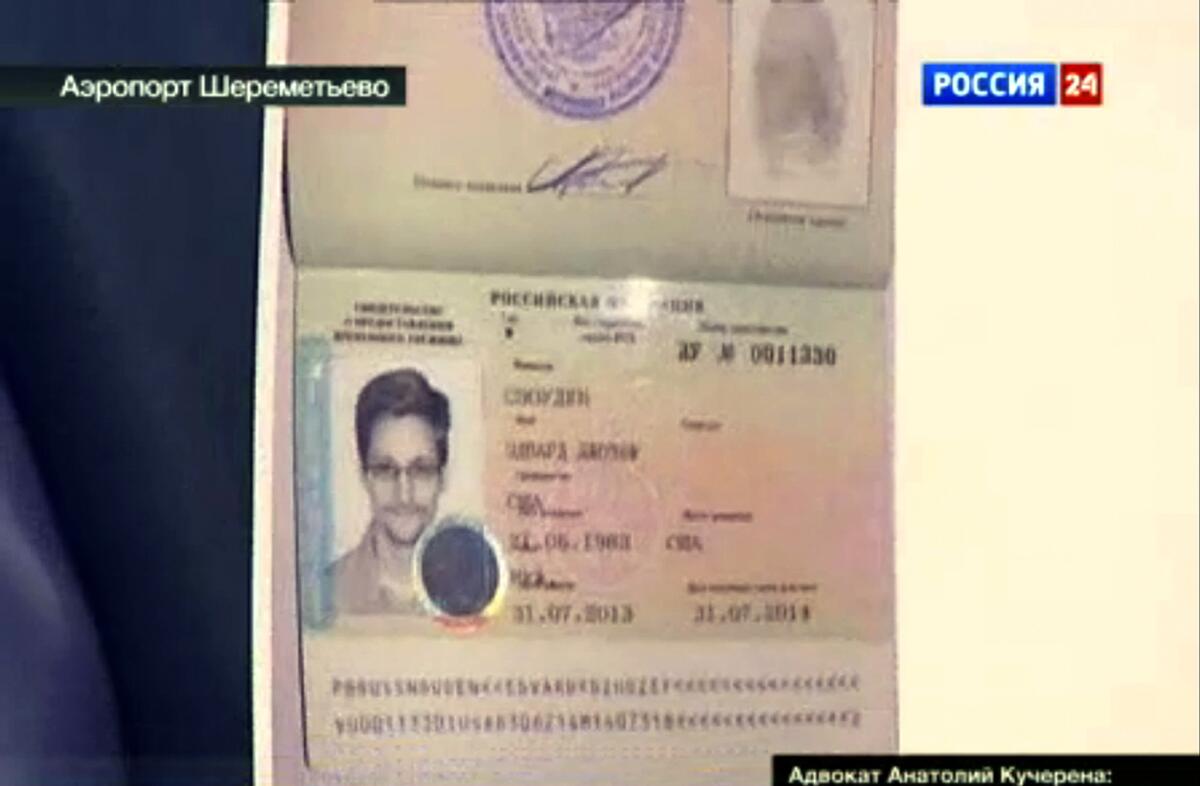Edward Snowden asylum ‘insignificant’ to Russia -- but not to U.S.

Russia’s decision to grant temporary asylum to NSA leaker Edward Snowden is “insignificant” and won’t negatively influence U.S.-Russian relations, an aide to President Vladimir Putin insisted shortly after the American fugitive was allowed to enter the country.
The assurance of business as usual between the former superpowers that was blithely offered by Kremlin aide Yuri Ushakov seemed to suggest that some back-channel agreement was in place between Moscow and Washington to downplay Snowden’s departure from Moscow’s Sheremetyevo International Airport, where he had been trapped in a diplomatic limbo since June 23.
But officials at the White House and State Department were reportedly angered by Moscow’s sudden move to give shelter to Snowden.
U.S. officials expressed deep disappointment in the decision that could worsen already difficult relations with Moscow.
Snowden, 30, may be wanted by the U.S. government on criminal charges brought after his massive leaks of clandestine National Security Agency surveillance programs, but he has become a folk hero to those who believe the intelligence services have violated constitutional protections against government intrusions into their private lives.
As ironic as it may seem for Russia to come to the aid of someone who would be whisked off to a Siberian prison for any similar betrayal of state interests, Putin has used Snowden’s plight as an opportunity to pose as a human rights defender and to cast the Obama administration as disingenuous when it criticizes the Kremlin for repressing political opponents.
“Our president has expressed the hope many times that this will not affect the character of our relations,” Ushakov told reporters in Moscow, adding that the Kremlin had no indication from Obama that he would cancel a planned visit to Russia next month in retaliation for the asylum move.
“This situation is rather insignificant and won’t influence political relations,” Ushakov said.
Russia specialists in Washington predicted that if U.S. officials don’t see signs of cooperation from Russia on key issues at a high-level meeting in Washington next week, Obama will cancel the planned September meeting with Putin in St. Petersburg, which Russia badly wants.
“This sets in motion a really negative dynamic,” said Andrew Weiss, who is vice president for studies at Carnegie Endowment for International Peace and was an advisor on Russia in the Clinton White House.
Rather than showing more cooperation on the issues that divide the former superpowers, Weiss speculated, Russia might react by resisting U.S. efforts to curtail the Iran nuclear program or seek to strengthen its ties with Tehran.
Steven Pifer, a former U.S. diplomat now at Brookings Institution, said he saw a growing likelihood that the White House would disengage from Russia. With the administration in its second term, and needing less help on issues like the war in Afghanistan, “the dynamic is different,” Pifer said.
The Russian government may be trying to force the White House to play along with the Kremlin’s view that the standoff over Snowden is a back-burner issue rather than publicly protesting a decision it was impotent to prevent.
Relations between Russia and the United States are already strained by deep disagreement over the war in Syria. Moscow sees the uprising against Syrian President Bashar Assad as a Western-backed attempt at executing regime change, while U.S. officials consider the 2-year-old civil war a justified rebellion against a corrupt and brutal autocrat.
Russia also chafes under U.S. criticism of human rights abuses like the prosecution of opposition figure Alexei Navalny, the jailing of Pussy Riot punk rockers for performing a protest song against Putin and the repression of its own whistle-blowers like Sergei Magnitsky, who died in custody in 2009 after disclosing widespread corruption among tax authorities.
Nationalist lawmakers in Russia enacted a ban on U.S. adoption of Russian orphans in retaliation for the U.S. Congress passing the Magnitsky Act, which bars Russian officials accused of rights abuses from entering the United States.
Some U.S. senators took the asylum decision as more proof that Obama’s effort to strengthen ties with Russia was failing.
“Time to hit that reset button again,” tweeted Sen. John McCain (R-Ariz.), mocking the White House claim to be opening a new, more cooperative chapter in relations with Russia.
Their reactions were a sign of how domestic pressure has been building for Obama to respond to what is seen in some quarters as Russia’s provocations toward the United States.
ALSO:
U.S., Pakistan agree to revive high-level talks
Zimbabwe election ends, war of words begins
Uruguay takes key step toward legalizing marijuanaTwitter: @cjwilliamslat
More to Read
Start your day right
Sign up for Essential California for news, features and recommendations from the L.A. Times and beyond in your inbox six days a week.
You may occasionally receive promotional content from the Los Angeles Times.








